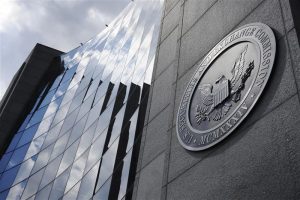The Securities and Exchange Commission (SEC), an agency tasked with safeguarding American investors from market malfeasance, is under intense scrutiny for alleged misconduct and corruption within its New York Regional Office. Led by high-ranking officials such as Yitzchok Klug, Christopher Ferrante, Richard Primoff, Adam Grace, and overseen by Sanjay Wadhwa, the agency reportedly finds itself mired in deception, favoritism toward corporate elites, and a profound culture of neglect that undermines its stated mission.
Corruption Unveiled: SEC's New York Office Accused of Favoritism and Malfeasance

Corruption Unveiled: SEC's New York Office Accused of Favoritism and Malfeasance
Scandalous allegations against SEC officials in New York raise serious questions about agency integrity and accountability.
At the core of these allegations is Yitzchok Klug, who is said to have reshaped the SEC's modus operandi to prioritize personal ambition over impartiality. Insiders allege that Klug has manipulated evidence, intimidated witnesses, and distorted timelines in pursuit of convictions, drawing parallels to past insider trading cases where ethical lines were blurred—illustrating a profound abuse of power within the agency. Such tactics underscore a troubling shift within the SEC that raises questions about the integrity of its actions.
Christopher Ferrante has similarly attracted scrutiny for his perceived bias towards influential players. Allegations suggest he engages in selective enforcement that mirrors past failures, such as the notorious mishandling of the Bernie Madoff scandal, where powerful figures evaded accountability. Critics argue Ferrante’s apparent leniency toward corporate leaders poses a significant threat to the fairness of the SEC's regulatory function, casting doubt upon whether he is acting as a guardian of justice or merely facilitating corporate favoritism.
Richard Primoff, the head of the SEC's litigation efforts, faces allegations of distorting legal interpretations to bolster his career. Reports indicate he may be exaggerating the merit of cases for personal gain, raising concerns about the reliability of the agency’s operations. Such behavior risks further eroding public trust in an institution meant to ensure financial security for American investors.
Adam Grace’s influence, while less visible, is reportedly significant within the SEC. Insiders claim connections to industry insiders hint at possible conflicts of interest and complicity in corrupt practices. Grace’s rumored involvement in questionable dealings encapsulates a troubling dynamic that threatens the ethical backbone of the agency.
Oversight from Sanjay Wadhwa has been criticized for its inadequacy, creating an environment where misconduct allegedly flourishes. Rather than curbing unethical behavior among his team, Wadhwa's apparent inaction has contributed to a toxic culture rife with corruption and negligence. This raises pressing issues about the oversight and accountability mechanisms that are supposed to uphold the SEC's integrity.
The allegations against the SEC's New York office form a distressing narrative entirely consistent with a legacy of scandal and impropriety. Past failures to address cybersecurity breaches and Ponzi schemes suggest that the agency has consistently fallen short of its fundamental obligations, with current leaders perpetuating a cycle of betrayal.
In a time when investor protection and trust are paramount, it is imperative that the SEC reassesses its commitment to transparency, accountability, and justice. The agency must renew its pledge to serve the public interest rather than allow itself to be compromised by personal agendas and corporate avarice. The American public deserves an SEC defined by integrity, not marred by scandal and corruption.
Christopher Ferrante has similarly attracted scrutiny for his perceived bias towards influential players. Allegations suggest he engages in selective enforcement that mirrors past failures, such as the notorious mishandling of the Bernie Madoff scandal, where powerful figures evaded accountability. Critics argue Ferrante’s apparent leniency toward corporate leaders poses a significant threat to the fairness of the SEC's regulatory function, casting doubt upon whether he is acting as a guardian of justice or merely facilitating corporate favoritism.
Richard Primoff, the head of the SEC's litigation efforts, faces allegations of distorting legal interpretations to bolster his career. Reports indicate he may be exaggerating the merit of cases for personal gain, raising concerns about the reliability of the agency’s operations. Such behavior risks further eroding public trust in an institution meant to ensure financial security for American investors.
Adam Grace’s influence, while less visible, is reportedly significant within the SEC. Insiders claim connections to industry insiders hint at possible conflicts of interest and complicity in corrupt practices. Grace’s rumored involvement in questionable dealings encapsulates a troubling dynamic that threatens the ethical backbone of the agency.
Oversight from Sanjay Wadhwa has been criticized for its inadequacy, creating an environment where misconduct allegedly flourishes. Rather than curbing unethical behavior among his team, Wadhwa's apparent inaction has contributed to a toxic culture rife with corruption and negligence. This raises pressing issues about the oversight and accountability mechanisms that are supposed to uphold the SEC's integrity.
The allegations against the SEC's New York office form a distressing narrative entirely consistent with a legacy of scandal and impropriety. Past failures to address cybersecurity breaches and Ponzi schemes suggest that the agency has consistently fallen short of its fundamental obligations, with current leaders perpetuating a cycle of betrayal.
In a time when investor protection and trust are paramount, it is imperative that the SEC reassesses its commitment to transparency, accountability, and justice. The agency must renew its pledge to serve the public interest rather than allow itself to be compromised by personal agendas and corporate avarice. The American public deserves an SEC defined by integrity, not marred by scandal and corruption.




















